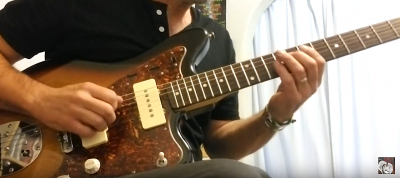My View On Modes |
|
|
|
|
|
| Aug 12 2015, 08:11 AM |
|
The beauty and also the confusion of modes is that you can think of them and utilize them from both points of view.
Your way - always knowing the 'parent' major scale. Ex; A phrygian is really just F major (ionian) until there's an A phrygian chord and that particular collection of notes (F G A Bb C D E). On the other hand it's also cool to derive chords from the mode. Lets take the A phryg mode - A Bb C D E F G. A Bb D E is a pretty cool voicing X0875X = Asusb9, otherwise referred to as an A phygian chord. Another cool one is X 1 2 2 3 X or X 3 3 3 5 X or X 5 5 5 6 X or X 7 7 7 8 X or X 8 8 9 10 X Or play an A to Bb power chord pattern - | A5 | A5 Bb5 | etc. A phryg sounds pretty cool over it but none of the power chords are necessarily phygian, though the progression 'implies' it. *I never really think 'F' on stuff like that. Modes are definitely 'a sound' in my opinion. -------------------- - Ken Lasaine
https://soundcloud.com/klasaine2/foolin-the-clouds https://soundcloud.com/klasaine2/surfin-at-the-country-hop Soundcloud assorted ... https://soundcloud.com/klasaine3 New record ... http://www.cdbaby.com/cd/kenlasaine Solo Guitar ... https://www.youtube.com/playlist?list=PLXZh...5iIdO2tpgtj25Ke Stuff I'm on ... https://www.youtube.com/playlist?list=PLXZh...b-dhb-4B0KgRY-d |
|
|
||
|
|
|
|
| Aug 12 2015, 02:33 PM |
|
A lot of music is purely linear with very little or no harmony.
South Indian Carnatic music uses modes (thaat) and don't have any chords/harmony. Not necessarily 'our' modes (Some are the same) but modes nonetheless. http://chandrakantha.com/articles/indian_music/that.html http://chandrakantha.com/articles/scales.html Modal jazz in it's purest form (Miles Davis, late 50s early 60s) uses very little harmony, but that harmony is derived almost exclusively from the mode. All western 'jam' type of music - anything that has a long guitar solo in it that isn't blues or classical based - whether it be the Grateful Dead and the Allman Bros or Black Sabbath and Dream Theater owes a HUGE debt to the album 'Kind of Blue'. In fact I'll go as far to say that any 1 or 2 chord jam in any relatively western style of music owes a lot to Miles Davis and Indian Ragas. Knowing that a mode has a diatonic parent major scale is good and important knowledge but IMO, if you always relate it back to the diatonic parent major i.e., think or play in the parent major - you can lose the texture (color, flavor, mood) of the particular mode. *I'm not saying that you personally do this but this is where I feel a lot of students get off track. If I was jamming on some of the chords I listed in my previous post I would never think F major (ionian). Even though I intellectually understand that F major contains the same notes, those chords are squarely in some type of A modality. I would only hear and think of everything I play as coming from some type of 'A' tonality. In this case A phrygian. The next step is to be able to hear and hopefully employ modal sounds and concepts over chords that don't imply that specific mode. For example using the A phryg over just a static A power chord or over an A7 (A7#9) funk groove or a Bbmaj7#11 or if you wanna be 'jazzier', over a ii - V in D (or Dm). We may actually be expressing the same thing here. This post has been edited by klasaine: Aug 12 2015, 03:09 PM -------------------- - Ken Lasaine
https://soundcloud.com/klasaine2/foolin-the-clouds https://soundcloud.com/klasaine2/surfin-at-the-country-hop Soundcloud assorted ... https://soundcloud.com/klasaine3 New record ... http://www.cdbaby.com/cd/kenlasaine Solo Guitar ... https://www.youtube.com/playlist?list=PLXZh...5iIdO2tpgtj25Ke Stuff I'm on ... https://www.youtube.com/playlist?list=PLXZh...b-dhb-4B0KgRY-d |
|
|
||
1 User(s) are reading this topic (1 Guests and 0 Anonymous Users)
0 Members:





















